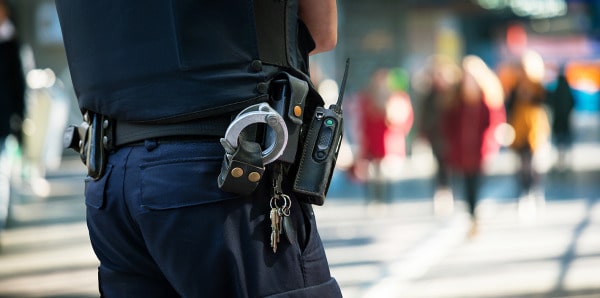Can Police Search Your Phone in California?
The surveillance forecasted almost 70 years ago in George Orwell’s 1984 has arrived. It is no longer necessary to go outside one’s home to be tracked and recorded. In recent years, efforts by cell phone companies, websites, and businesses to track customer location and behavior became well-publicized, and this information is increasingly being used as evidence in criminal cases, which criminal defense attorneys must combat to protect the defendant’s rights.
In addition, there is a growing number of both private and public security cameras that are impossible to escape as soon as one steps outside. Unless a person chooses to become a hermit who exists completely offline, surveillance of some sort is occurring all the time. While this persistent sense of always feeling followed is generally unnerving, when police get involved because they suspect a person is connected to a crime, the consequences become truly scary.
Law enforcement is now beginning to deploy facial recognition technology to identify and catch suspects, which is quite concerning considering the lack of studies supporting its accuracy. A Colorado man faced this situation head-on when police incorrectly identified him as the perpetrator of two separate bank robberies. But, the technology most commonly used to follow and implicate someone in a crime is the cell phone due to the central role it plays in the lives of most people. People have a substantial privacy interest in their cell phones, and special rules apply when police want to search these devices as a result.
The requirements and exceptions for cell phone searches will be explored below.

How Does Police Use Cell Phone Data?
In order for the state to convict a person of a crime, the prosecution must produce evidence of a defendant’s guilt beyond a reasonable doubt. One central element in many prosecutions is the location of the defendant while the criminal activity took place, and specifically, whether the defendant was in the vicinity of the alleged crime. Without evidence to place the defendant at the scene, jurors are unlikely to find enough evidence of guilt.
Cell phone location data collected and retained by cell phone providers, while lacking in pinpoint accuracy, can indicate a person’s general location every time he/she makes a phone call, sends a text, or accesses the internet. This is highly private digital information that, for the first time ever, allows law enforcement to track a person’s movements without direct surveillance (activity for which police must obtain a warrant). Such information could conceivably infer a false connection to a crime, and thus, law enforcement’s access to and use of this data is a critical issue.
California does have a law requiring a warrant to gain access to cell phone provider records, but federal authorities have no such restriction, and currently, can get this information without showing the same level of cause.
Do the Police Need a Search Warrant to Access Your Cell Phone?
In the vast majority of cases, police need a search warrant to access the information contained in a person’s cell phone. When police apply for a warrant they must specifically identify the cell phone they intend to search and the evidence they are seeking.
A search warrant allows police to search any specified area for evidence of criminal activity, including a person’s home, car, cell phone, or workplace. If police find evidence supporting the alleged criminal activity, they are also allowed to seize it.
This type of search and seizure is only permitted under a valid warrant, unless an exception to this rule applies, such as:
- the owner’s consent
- the search is connected to a lawful arrest
- the evidence was in plain view
To convince a judge that a warrant is justified, there must be evidence a crime was committed, and the proposed area to search is likely to contain evidence of the said crime. Further, the judge must find there is “probable cause” or a reasonable belief that the person named, or items described in the warrant will be found at the designated location.
Typically, the judge will take oral or written affidavits from law enforcement, the prosecutor, or a witness about the facts of the case to see if probable cause exists. However, if a warrant is issued improperly, this fact would give the defense cause to request dismissal of criminal charges or the exclusion of seized evidence.
If the police search electronic devices other than the one listed in the warrant or gather evidence outside of what was authorized, the search is invalid, and police are not permitted to use this information against the defendant. However, note that police can seize possession of someone’s phone as part of an arrest, and retain it until a search warrant is secured.
What are the Warrant Exceptions?
While individuals do have a large privacy interest in the content of cell phones, there are exceptions to the warrant requirement when the government’s interest is considered more important or the privacy interest is waived.
The exceptions to the warrant requirement include:
- the owner consents to the search freely and voluntarily
- exigent circumstances due to the presence of an emergency.
Some examples of circumstances that may constitute a true emergency occur when the police reasonably believe that:
- the phone is about to be remotely wiped;
- the phone contains data that will allow them to track a suspect; or
- the information on the phone can help prevent harm to someone else.
If police conduct an illegal search of a person’s phone, the person has the right to challenge the validity of the evidence and ask a court to suppress its use.
Blocking the introduction of evidence can lead to reduced charges or a dismissal of the criminal case, so having a criminal defense attorney that carefully analyzes the state’s evidence to check for illegalities is essential to a strong defense.
Hire a Los Angeles Criminal Defense Lawyer
If you are facing criminal charges, do not delay hiring a defense attorney to protect your rights. Public defenders are burdened with unreasonable caseloads, and consequently, cannot give your case the attention it needs.
Those charged with a crime in the Los Angeles area should contact the Manshoory Law Group, APC for experienced criminal defense representation. Attorneys are available 24/7 to answer your calls. Contact us for a free consultation.


